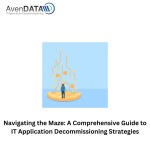In the dynamic world of information technology, effective decommissioning of SAP systems is a critical task that ensures seamless transitions and uninterrupted business operations. However, this process demands a unique set of skills and extensive training to manage the complexities involved. This blog explores the essential training and skill development strategies for SAP decommissioning projects, emphasizing the importance of preparedness and proficiency in executing these tasks.
Understanding the Scope of SAP Decommissioning
SAP decommissioning is not merely about shutting down old systems. It involves careful planning, data migration, risk management, and ensuring compliance with regulatory requirements. As organizations strive to modernize their IT infrastructure, the role of skilled professionals in SAP decommissioning becomes paramount. These professionals must possess a deep understanding of SAP environments, data integrity principles, and project management skills.
Key Skills for SAP Decommissioning
Technical Proficiency in SAP Systems
SAP Module Knowledge: Understanding different SAP modules and their interdependencies.
Project Management Skills
Planning and Coordination: Developing detailed decommissioning plans, timelines, and resource allocation.
Regulatory and Compliance Expertise
Understanding Regulations: Familiarity with industry-specific regulations and compliance requirements related to data retention and decommissioning.
Problem-solving and Analytical Skills
Troubleshooting: Ability to identify and resolve issues that arise during the
Effective Training Strategies
Comprehensive Training Programs
Vendor-Specific Training: Enroll in SAP-certified training programs that provide in-depth knowledge of SAP systems and decommissioning processes.
On-the-Job Training
Mentorship Programs: Pairing less experienced team members with seasoned professionals to provide guidance and knowledge sharing.
Cross-Functional Training
Collaborative Learning: Encouraging collaboration between IT, compliance, and business units to ensure a holistic understanding of decommissioning impacts.
Conclusion
Effective SAP decommissioning requires a blend of technical expertise, project management acumen, regulatory knowledge, and problem-solving skills. Investing in comprehensive training and skill development programs is essential for building a proficient team capable of executing seamless decommissioning projects. By equipping professionals with the necessary skills and knowledge, organizations can ensure a smooth transition from legacy systems to modern IT infrastructures, paving the way for continued growth and innovation.





.jpg)
Comments